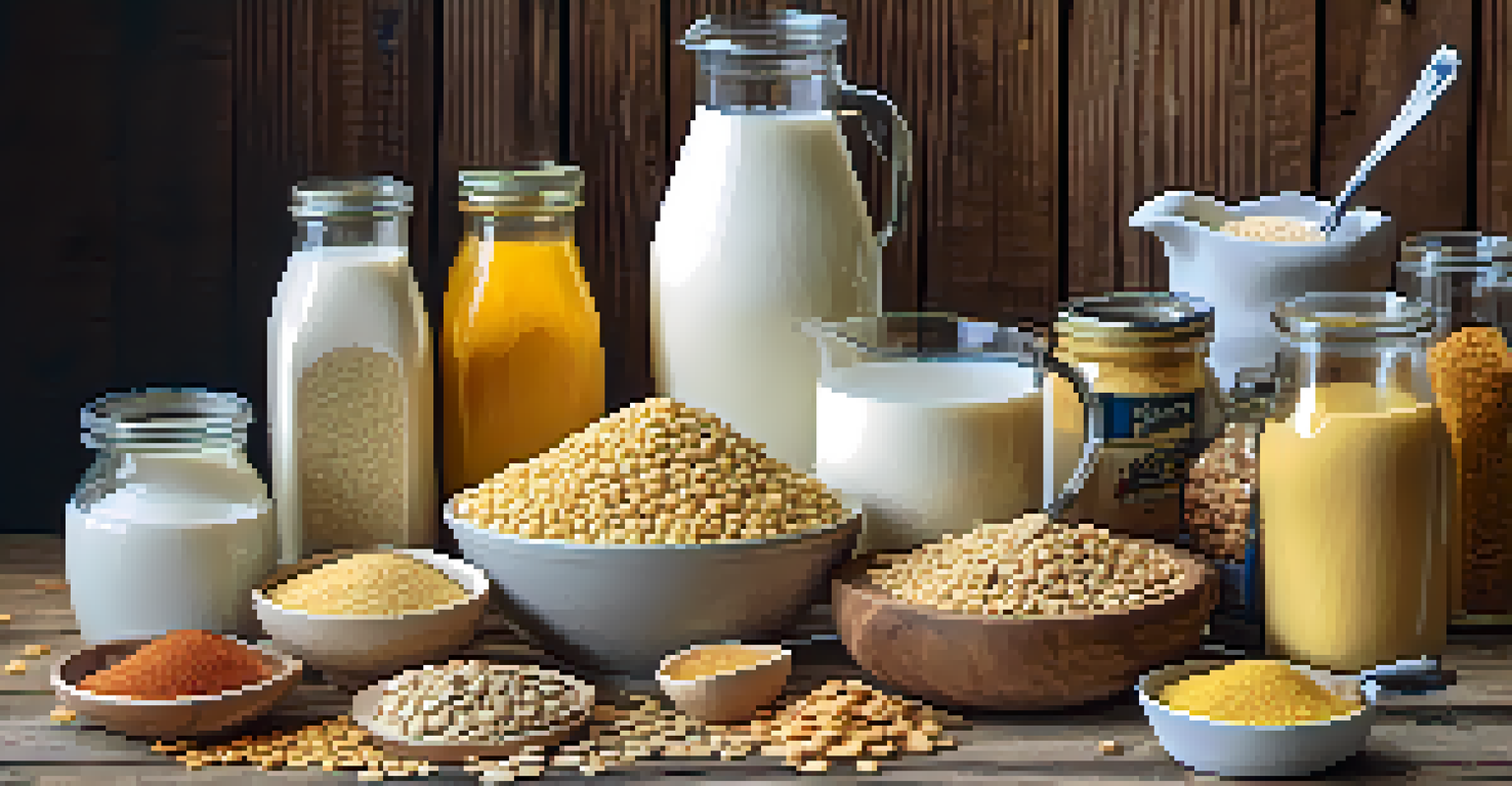Vegan Vitamin B12: Essential for Your Child's Growth

What is Vitamin B12 and Why is it Important?
Vitamin B12, also known as cobalamin, is a crucial nutrient that supports many bodily functions, including nerve health and the production of DNA. For children, this vitamin plays a vital role in proper growth and development, particularly in forming red blood cells and maintaining brain function. Without adequate levels, children may experience fatigue, weakness, and developmental delays.
Nutrition is a crucial part of a child's development, and understanding their needs can make a world of difference.
While Vitamin B12 is often found in animal products like meat, dairy, and eggs, it can be challenging for those following a vegan diet to meet their needs. This makes understanding and incorporating B12 into a child's diet even more critical for vegan families. It's essential to ensure that children receive this vitamin to support their overall health and well-being.
For parents, the idea of ensuring their child gets enough Vitamin B12 might feel overwhelming. However, with the right knowledge and resources, you can provide a balanced and nutritious vegan diet that meets your child's needs. Let's dive into how to effectively include this vital nutrient in your child's meal plan.
Sources of Vegan Vitamin B12
Fortunately, there are several vegan-friendly sources of Vitamin B12 available. Fortified foods, such as plant-based milks, breakfast cereals, and nutritional yeast, are excellent options. These products are often enriched with B12, making them a simple addition to your child's diet.

In addition to fortified foods, B12 supplements are another reliable way to ensure your child is getting enough of this essential nutrient. These supplements come in various forms, including tablets, sprays, and even gummies, making them appealing to children. When choosing a supplement, it's crucial to consult with a pediatrician to determine the appropriate dosage for your child's age and needs.
Vitamin B12: Essential for Growth
Vitamin B12 is vital for children's growth, supporting nerve health and DNA production, especially in vegan diets.
Integrating these sources into your child's meals can be done creatively. For instance, sprinkling nutritional yeast over popcorn or stirring it into pasta can make for a tasty and nutritious snack. By making B12-rich foods enjoyable, you can help your child embrace a healthy vegan lifestyle.
Symptoms of Vitamin B12 Deficiency
Recognizing the signs of Vitamin B12 deficiency is vital for any parent. Common symptoms may include fatigue, pale skin, or even behavioral changes such as irritability and difficulty concentrating. In more severe cases, it can lead to neurological issues and developmental delays, which can be particularly concerning in growing children.
The food you eat can either be the safest and most powerful form of medicine or the slowest form of poison.
If you notice any of these symptoms in your child, it's essential to consult with a healthcare professional. They can provide a thorough evaluation and recommend appropriate dietary changes or supplementation. Early intervention is key to preventing long-term health issues related to B12 deficiency.
Being proactive about your child's nutrition not only helps avoid deficiencies but also promotes a healthier lifestyle overall. By staying informed and attentive to your child's dietary needs, you can ensure they are thriving both physically and mentally.
How to Include B12 in Your Child's Diet
Incorporating Vitamin B12 into your child's diet doesn't have to be difficult. Start by including fortified foods in meals and snacks, such as adding fortified plant-based milk to smoothies or using fortified cereals as a breakfast option. These small changes can make a significant impact on your child's B12 intake.
Another fun way to engage your child in their nutrition is by involving them in meal preparation. Let them help you sprinkle nutritional yeast on their favorite dishes or choose snacks that are fortified with B12. This not only makes them more excited about what they're eating but also fosters a sense of responsibility for their health.
Sources of Vegan B12
Fortified foods and supplements are key vegan sources of Vitamin B12 that can easily be included in children's diets.
By creating a diverse and balanced meal plan that includes B12-rich options, you can help ensure your child meets their nutritional needs. Remember, the goal is to make healthy eating enjoyable and sustainable, setting the foundation for lifelong healthy habits.
Consulting a Healthcare Professional
When it comes to your child's nutrition, seeking guidance from a healthcare professional is always a wise choice. A pediatrician or a registered dietitian can provide personalized advice tailored to your child's specific dietary needs, ensuring they are getting sufficient Vitamin B12. This is especially crucial for children on a vegan diet, as their nutritional requirements may differ from those who consume animal products.
Regular check-ups can also help monitor your child's growth and development, allowing for any necessary adjustments to their diet or supplementation. By keeping the lines of communication open with your healthcare provider, you can stay informed about the best practices for your child's nutrition.
Remember, advocating for your child's health is an important responsibility. By partnering with professionals, you can confidently navigate the world of vegan nutrition and ensure your child receives the essential vitamins and minerals they need to thrive.
Vegan Parenting and Nutritional Education
Vegan parenting often comes with the unique challenge of ensuring children receive all necessary nutrients, including Vitamin B12. Educating yourself and your children about nutrition can empower you to make informed choices that support their growth. Use resources such as books, documentaries, and online platforms dedicated to vegan nutrition to enhance your family's understanding.
Involving your child in conversations about nutrition can also foster a positive attitude toward healthy eating. Discuss the benefits of various foods and how they contribute to their health and well-being. This approach not only helps them make better choices but also instills a sense of curiosity about food.
Consult Experts for Nutrition
Partnering with healthcare professionals ensures children receive adequate Vitamin B12 and meet their unique nutritional needs.
As your child learns more about nutrition, they may become more open to trying new foods and recipes. This exploration can lead to a broader palate and a greater appreciation for a variety of plant-based options, making mealtime an exciting adventure.
Conclusion: The Importance of B12 for Vegan Kids
In conclusion, ensuring your child receives adequate Vitamin B12 is essential for their growth and development, especially on a vegan diet. By incorporating fortified foods, considering supplements, and consulting with healthcare professionals, you can create a balanced and nutritious meal plan. Remember, a little knowledge goes a long way in supporting your child's health.
As you navigate vegan parenting, keep in mind that every child's nutritional needs are unique. Stay attuned to their preferences and health requirements, and don't hesitate to make adjustments as needed. A proactive approach will help you foster a healthy lifestyle for your child that they can carry into adulthood.

Ultimately, the goal is to empower your child to embrace a vibrant and healthy vegan lifestyle. With the right tools and resources, you can ensure they are not just surviving but thriving on a plant-based diet, enriched with all the essential nutrients they need.